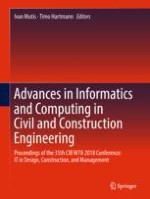2019 | OriginalPaper | Buchkapitel
91. Machine-Learning-Based Model for Supporting Energy Performance Benchmarking for Office Buildings
verfasst von : Lufan Wang, Nora M. El-Gohary
Erschienen in: Advances in Informatics and Computing in Civil and Construction Engineering
Aktivieren Sie unsere intelligente Suche, um passende Fachinhalte oder Patente zu finden.
Wählen Sie Textabschnitte aus um mit Künstlicher Intelligenz passenden Patente zu finden. powered by
Markieren Sie Textabschnitte, um KI-gestützt weitere passende Inhalte zu finden. powered by
